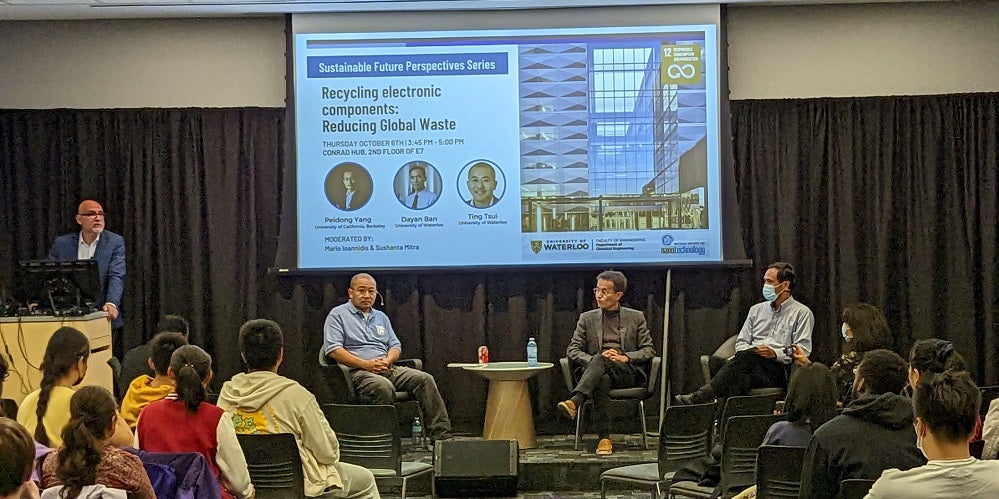
Most people have the annual itch to upgrade their cell phone or get a faster laptop. After all, where’s the harm in treating yourself?
BBC News reports that the International Waste Electrical and Electronic Equipment (WEEE) Forum has stated that 5.3 billion mobile phones will be discarded in 2022.
The first event in a series titled “Sustainable Future Perspectives”, jointly organized by the Department of Chemical Engineering and the Waterloo Institute for Nanotechnology (WIN), aimed to raise awareness about the global ramifications of electronic waste (E-waste) generated by our voracious consumption of electronics.
During the October 6th event panelists discussed the challenges and impact of the mammoth generation of E-waste globally.
Developed countries produce most E-waste, which is shipped to developing nations, often ending up in uncontrolled dumpsites and recycling facilities with low safety standards, negatively impacting human health and the environment.
The event featured Dr. Peidong Yang, S. K. and Angela Chan Distinguished Chair Professor in Energy at the University of California, Berkeley. He was joined in the discourse by Dr. Ting Tsui, Program Director of Nanotechnology Engineering and Dr. Dayan Ban, professor in the Department of Electrical and Computer Engineering from the University of Waterloo.
Organizers Dr. Mario Ioannidis, Chair of the Department of Chemical Engineering and Dr. Sushanta Mitra, Executive Director of WIN acted as moderators, facilitating dialogue with the audience that included many students.
The discussion drew attention to rapidly developing limitations to the supply of numerous chemical elements commonly found in liquid crystal displays and batteries. Due to rapidly depleted natural resources, society will soon be forced to consider “urban mining” in a circular economy. Urban mining would involve reclaiming these minerals and elements from discarded electronic devices. Developing novel technologies for urban mining presents promising opportunities for entrepreneurship.
“Many years after Prometheus brought fire to humankind, our interaction with materials is at a crossroads,” said Ioannidis. “Creating a circular economy is a difficult, but necessary path. We hope that discussions like this will inspire collaboration and entrepreneurship across disciplinary lines.”
The conversation also emphasized that changing consumer behaviour must be part of any successful solution. The panelists agreed that all nations should enact policies for proper and safe recycling of E-waste as a critical step in solving this global issue.
“This perspective series will help our Waterloo community and beyond to draw attention that integrating sustainability in technology development will create a better world for everyone,” said Mitra.
The second event in the series of Sustainable Future Perspectives is planned for the winter term.